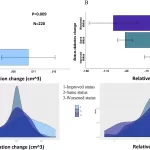PHILADELPHIA – October 2024 — Weight loss surgery and certain medications provide similar weight loss outcomes for patients with obesity, but each approach has distinct safety considerations, according to new findings presented at the American College of Gastroenterology (ACG) 2024 Annual Scientific Meeting. Roux-en-Y gastric bypass (RYGB) surgery was shown to yield the most significant weight reduction among treatments, while the medication tirzepatide demonstrated comparable effectiveness with a favorable safety profile.
A comprehensive meta-analysis led by Dr. Jena Velji-Ibrahim from Prisma Health–Upstate/University of South Carolina School of Medicine analyzed 34 randomized controlled trials (RCTs) involving 15,660 patients. The study compared 11 different weight loss interventions, including bariatric surgeries, bariatric endoscopies, and medications approved by the U.S. Food and Drug Administration. Each intervention was evaluated based on total body weight loss and side-effect profiles over a treatment duration of 52 weeks.
Significant Findings: Surgery vs. Medication
The analysis ranked Roux-en-Y gastric bypass as the most effective intervention, resulting in a 19.29% reduction in body weight, outperforming other surgical methods and weight loss medications. However, the drug tirzepatide, a glucagon-like peptide-1 receptor agonist (GLP-1 RA) and glucose-dependent insulinotropic polypeptide (GIP) receptor agonist, achieved a comparable weight loss of 15.18% and demonstrated a favorable safety profile. When directly compared, there was no significant difference in weight loss outcomes between tirzepatide and certain surgical options, such as one-anastomosis gastric bypass (OAGB) and laparoscopic sleeve gastrectomy.
“While RYGB produced maximal weight loss, medications like tirzepatide provide substantial benefits and have fewer adverse events,” Dr. Velji-Ibrahim noted. “This suggests medications may serve as a viable alternative for patients who seek less invasive treatment options.”
Endoscopic Options: A Minimally Invasive Alternative
The meta-analysis also highlighted the effectiveness of bariatric endoscopy as a minimally invasive weight loss method. Treatments such as endoscopic sleeve gastroplasty and transpyloric shuttle achieved significant weight reduction with fewer adverse events than traditional bariatric surgeries.
Dr. Velji-Ibrahim noted, “Endoscopic options offer good weight loss outcomes with a more favorable side-effect profile compared to surgery, including no increased mortality risk or intensive care requirements.”
Gastrointestinal Side Effects Common Among Medications
For weight loss medications, gastrointestinal issues were the most frequently reported side effects, including nausea, vomiting, diarrhea, and constipation. While these symptoms were generally manageable, they highlight the importance of personalized treatment selection based on individual health needs and tolerance levels.
Moving Forward: Combination Therapies
Experts are shifting toward combination therapies, which may maximize weight loss outcomes while enhancing safety. During a session following the presentation, Dr. Shivangi T. Kothari of the University of Rochester Medical Center commented on the potential for integrated approaches in obesity management. “Rather than comparing one modality to another, we might see the future of obesity treatment focus on combination therapies for sustained weight loss,” she suggested.
Another study presented at ACG 2024 by Dr. Nihal Ijaz I. Khan examined combining endoscopic bariatric treatments with GLP-1 RAs. The study, which included 266 patients, revealed that those who underwent a combination of endoscopic treatments and GLP-1 RAs, specifically liraglutide, experienced greater absolute weight loss compared to endoscopic treatment alone.
Future Implications for Obesity Management
This growing body of evidence underscores the need for personalized, multi-modal obesity treatments that balance efficacy and safety. The findings encourage healthcare providers to consider patient preferences, safety concerns, and the potential for combination therapies when recommending weight loss strategies.
With further studies planned to refine combination approaches and assess long-term outcomes, these insights offer promising directions in the evolving field of obesity management.











